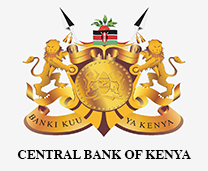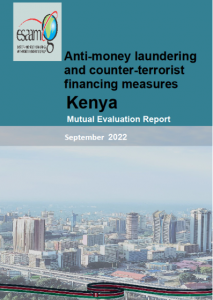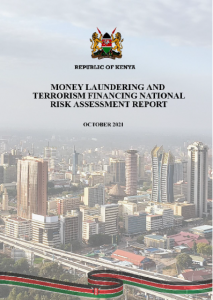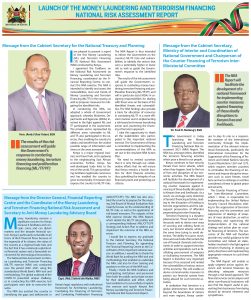MANDATE
The Central Bank of Kenya is responsible for supervising and enforcing the compliance with the Proceeds of Crime and Anti-Money Laundering Act, 2009 and attendant Regulations of financial institutions under its purview:
- Commercial Banks
- Mortgage Finance Companies
- Microfinance Banks
- Money Remittance Providers
- Foreign Exchange Bureaus
- Digital Credit Providers
- Payments Service Providers
- Mortgage Refinance Companies
In exercising this mandate, CBK seeks to ensure that Kenya’s financial system and the broader economy is protected from the threats of money laundering and the financing of terrorism and proliferation. This contributes to strengthening of financial sector integrity and enhancement of safety and security of the country.
LEGISLATION
Kenya is committed to full implementation of international standards on tackling money laundering, terrorism and proliferation financing as set by the Financial Action Task Force (FATF)[1].
Kenya’s primary legislative framework enacted to combat money laundering and countering the terrorism and proliferation financing (AML/CFT/CPF) consists of the:
- Proceeds of Crime and Anti Money Laundering Act, 2009 (POCAMLA)
- Proceeds of Crime and Anti Money Laundering Regulations, 2013
- Prevention of Terrorism Act, 2012 (POTA)
- Prevention of Terrorism (Implementation of the United Nations Security Council Resolutions on Suppression of Terrorism) Regulations, 2013
Pursuant to section 33(4) of the Banking Act, Central Bank of Kenya has also issued a Guideline on Anti-Money Laundering and Combating the Financing of Terrorism.
[1] The Financial Action Task Force (FATF) is the global money laundering, terrorism and proliferation financing watchdog. The inter-governmental body sets international standards that aim to prevent these illegal activities and the harm they cause to society.
REPORTS
Mutual Evaluation Report of Kenya, September 2022
Kenya underwent an Anti-Money Laundering, Counter Terrorist Financing and Counter Proliferation Financing (AML/CFT/CPF) assessment by the Eastern and Southern Africa Anti-Money Laundering Group (ESAAMLG). This was aimed at assessing Kenya’s compliance with global AML/CFT/CPF standards as set by Financial Action Task Force (FATF).[1]
ESAAMLG published the Mutual Evaluation Report of Kenya (September 2022) on November 9, 2022.
This report summarises the AML/CFT measures in place in the Republic of Kenya as at the date of the on-site visit which took place in 2022. It analyses the level of compliance with the Financial Action Task Force (FATF) standards and the level of effectiveness of Kenya’s AML/CFT system and provides recommendations on how the system could be strengthened. Read more
NATIONAL RISK ASSESSMENT
Money Laundering (ML) and Terrorism Financing (TF) National Risk Assessment (NRA) is a self-assessment process through which a country deepens its understanding of its unique money laundering and terrorism financing landscape. The output of the NRA process is a report detailing a country’s specific risk profile as well as a corresponding strategy and an action plan to mitigate identified risks.
The NRA was carried out by a Taskforce gazetted in 2019, through a consultative process aligned to international Anti-Money Laundering/Combatting Financing of Terrorism (AML/CFT) standards, involving both the public and private sectors.
The Money Laundering and Terrorism Financing National Risk Assessment Report (NRA) was launched on July 27, 2022.
The report is the output of a self-assessment process through which the country sought to understand its unique money laundering and terrorism financing landscape. The report details a country’s specific risk profile as well as a corresponding strategy and an action plan to mitigate identified risk areas. Read more
Read the CBK Press Release on the launch of the NRA report here…
Read the pull-out on the NRA report published on Daily Nation here…
[1] The Financial Action Task Force (FATF) is the global money laundering, terrorism and proliferation financing watchdog. The inter-governmental body sets international standards that aim to prevent these illegal activities and the harm they cause to society.
UPDATES
1267 List (Al-Qaida Sanctions List)
This list is maintained by the 1267 Committee, a committee established by the United Nations Security Council Resolution 1267. This list contains information on individuals and groups involved with Al-Qaeda. This list is available on the United Nation’s website in 3 formats; PDF, XML and HTML (click to see list).
Financial Action Task Force (FATF) High-Risk Jurisdictions subject to a Call for Action
High-risk jurisdictions have significant strategic deficiencies in their regimes to counter money laundering, terrorist financing, and financing of proliferation. For all countries identified as high-risk, the FATF calls on all members and urges all jurisdictions to apply enhanced due diligence, and, in the most serious cases, countries are called upon to apply countermeasures to protect the international financial system from the money laundering, terrorist financing, and proliferation financing (ML/TF/PF) risks emanating from the country.



